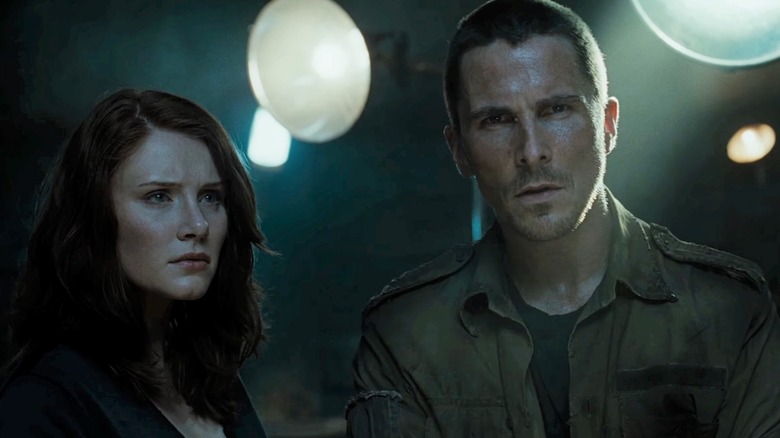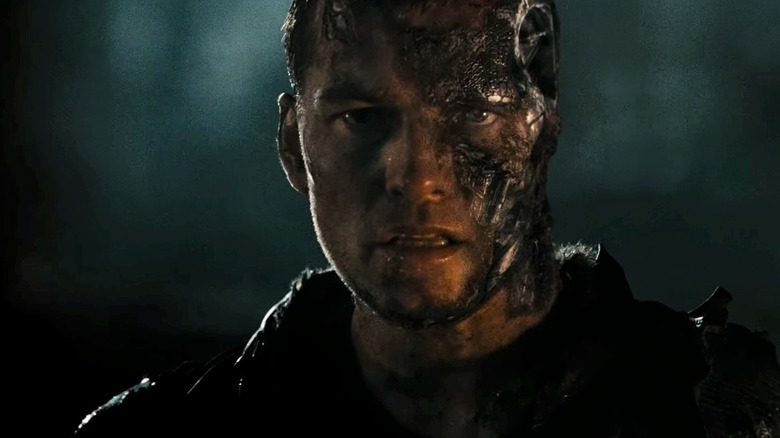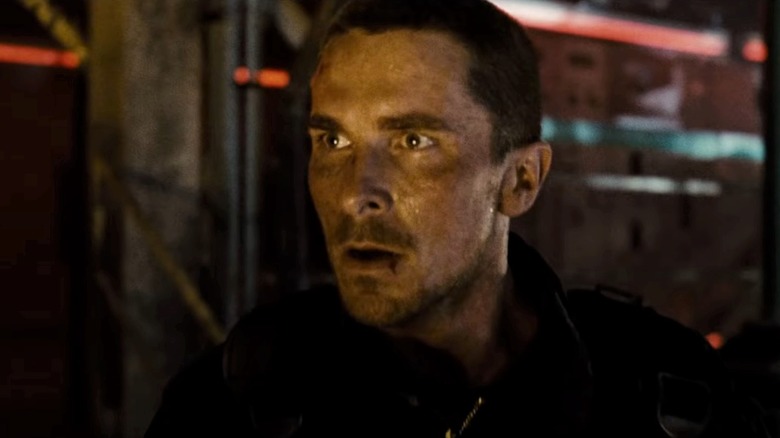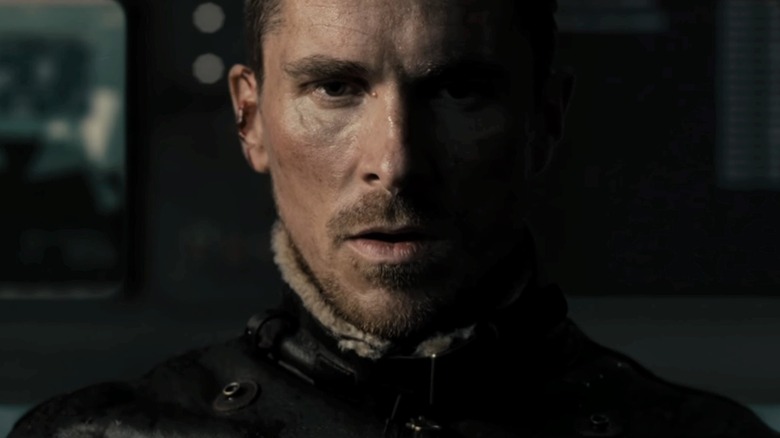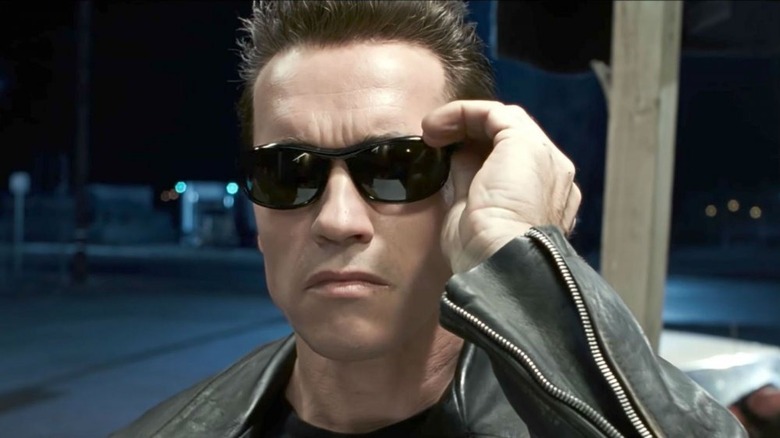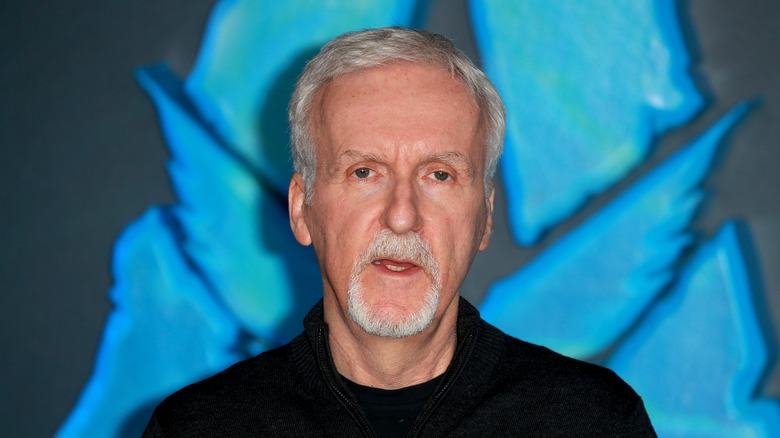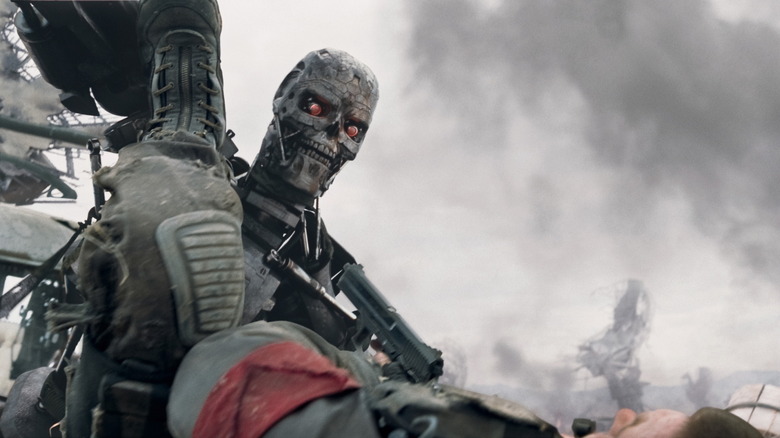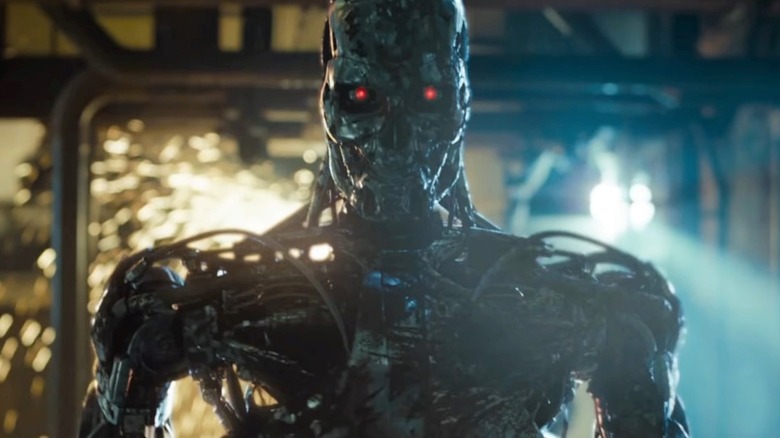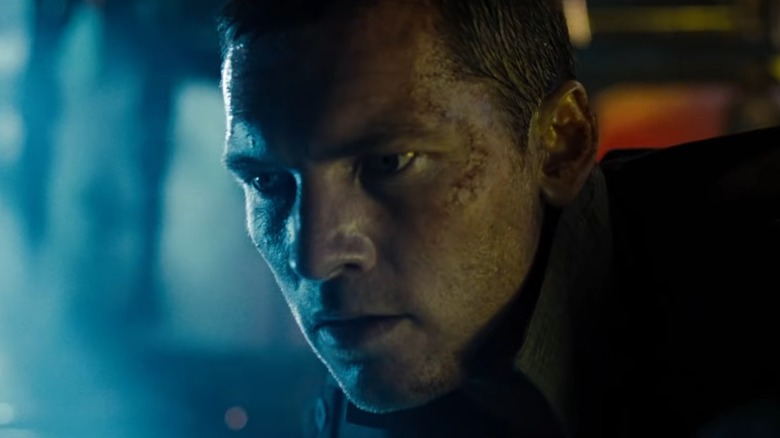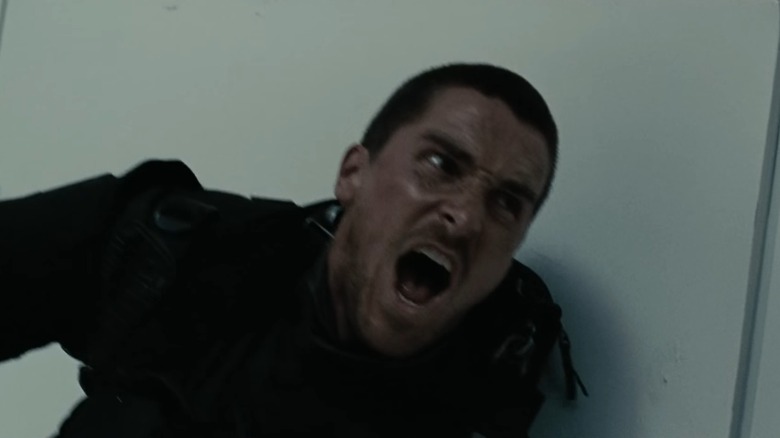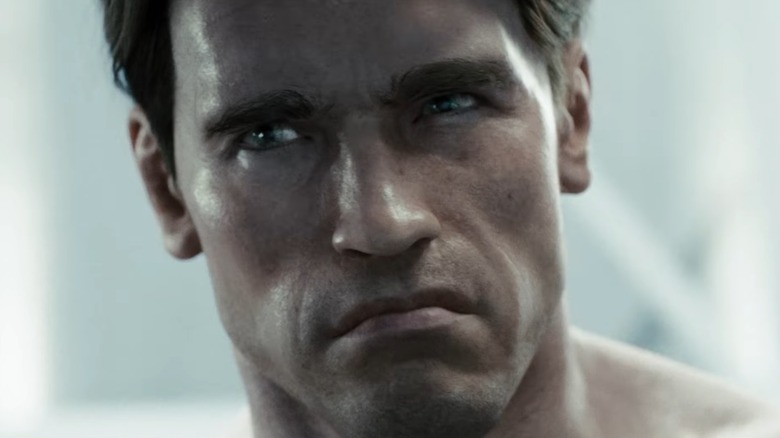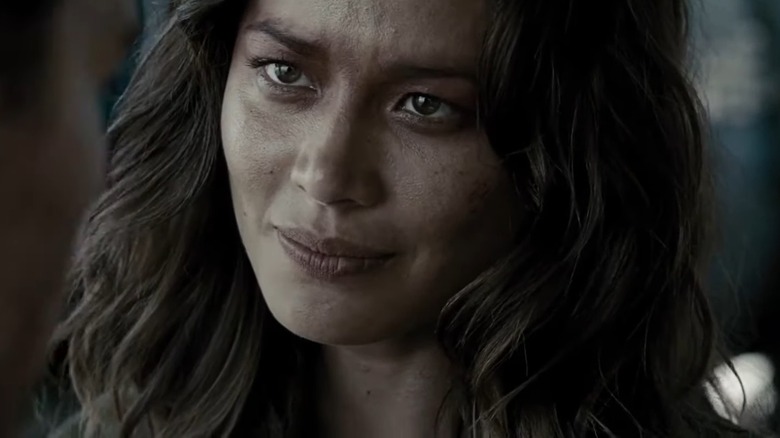Why McG's Terminator Salvation Bombed At The Box Office
The fourth entry in the complicated "Terminator" franchise, "Terminator Salvation," is the first to actually take place in this doomed future where an adult John Connor is the face of the Resistance and takes down ChatGPT's children. Directed by McG, and starring Christian Bale and Sam Worthington as John Connor and Marcus Wright respectively, the 2009 sci-fi action is also renowned for not having franchise star Arnold Schwarzenegger appear in it, though his likeness is used digitally in the film.
Much like every sequel after "Judgment Day," "Salvation" received the same criticism: it just isn't as good as the first two movies in the franchise. In Hollywood, though, no studio exec really cares what anyone says as long as those sweet Benjamins keep rolling in, but this didn't happen with "Salvation." With a mega production budget of $200 million, there was an expectation it would at least match the box office receipts of "Terminator 3: Rise of the Machines," which brought in around $433 million worldwide. Yet, McG's film tapped out at $371 million and spare change.
But where did it go wrong? And does "Salvation" deserve to be the third-lowest-grossing film in the franchise? Let's take a look at all the factors behind the audience saying, "Hasta la vista," to this film back in 2009.
The writers strike impacted the script
Despite the fanfare surrounding actors and directors, most viewers forget the fundamental rule: If the script sucks, no one can save it. Writers deserve credit for the stories they weave — and if anyone disputes this fact, they must take a look at the second season of "Heroes" as proof of what happens when a writer's influence is minimized. So, what does any of this have to do with "Terminator Salvation"? The 2007-2008 Writers Guild of America strike, of course.
Speaking to MTV, Christian Bale confirmed the strike's impact on the film. "We had a few writers, because of the whole situation with the writer's strike, and coming off of that," he said. "But we were very lucky for the short time ... That my friend Jonathan Nolan came in [to work on it]." When "Salvation" was released, Nolan's name was nowhere to be found as the screenwriting credits listed only John Brancato and Michael Ferris, who wrote the original script for the film and its predecessor. McG admitted that there were several writers who worked on the film and didn't know why Nolan's name wasn't there, but he credited him for the overall vision of the final film.
Another recasting of John Connor
Pop quiz time: What is the quickest way to break the internet and send the fandom into fury? Answer: Announce a recasting of a popular fictional character. "Terminator" fans were barely coming to terms with Nick Stahl having replaced Edward Furlong as John Connor in 2003's "Rise of the Machines," when they were hit with the shocking announcement Christian Bale would now be portraying the proverbial savior of humanity in the follow-up movie.
From a storyline perspective, it made sense that Connor would be slightly older since "Terminator Salvation" takes place in the future; however, there is only a three-year age gap between Bale and Furlong. Undoubtedly, most fans would have welcomed seeing Furlong back in the role here, instead of yet another recasting. Although it must be said: Bale had become a beloved actor thanks to his turn as Batman, Furlong is and will forever be closely associated with the part of Connor.
Coupled with the fact that there was no Linda Hamilton, Arnold Schwarzenegger, or James Cameron present either, a large number of audience members saw this more as a reboot than a continuation of the story. Interestingly enough, Bale confirmed to CNN that he had originally been courted to play Marcus Wright before the Connor role was expanded upon and he pivoted toward it.
Christian Bale didn't want to do the movie
It's always dicey when the lead star and director wonder what's the purpose of a movie. If they don't believe in it, who will? That's something "Terminator Salvation" had to contend with from the start. McG admitted to CNN he wasn't sure about signing up until he read the story. Similarly, Christian Bale turned down the opportunity to play Marcus Wright when he was approached with the story. "The whole idea of a 'Terminator' movie was sent to me and I said no," he said.
McG revealed that he headed off to the set of "The Dark Knight" to convince Bale about the role. After the script was rewritten and the character of John Connor was fleshed out further, the star signed on to play the leader of the Resistance. Years later, while appearing on the "Happy Sad Confused" podcast (via The Playlist), Bale revealed he turned down the movie three times and had others telling him not to take it, so he took it as a challenge. "It's a great thorn in my side because I wish we could have reinvigorated [the franchise]," he said. "And unfortunately, during production, you could tell that wasn't happening. It's a great shame."
No Arnold Schwarzenegger
What Sylvester Stallone is to "Rambo" is what Arnold Schwarzenegger is to "Terminator." This is his franchise and everyone else is shotgunning along for the ride. The average person on the street might not know the full story of this series, but they will be able to provide one-liners and easily link Schwarzenegger with the infamous T-800.
After dominating Hollywood, Schwarzenegger turned his head toward politics and became the Governor of California from 2003 to 2011. Being in public office meant a different set of responsibilities, and he stepped away from acting. It was his choice, though, as he committed to his political career during this period and made it his primary focus. Without a shadow of a doubt, Schwarzenegger's absence loomed over "Terminator Salvation."
It just didn't feel the same without the square-jawed Austrian superstar. Fans and critics agreed that it was tough to get excited about a "Terminator" film without the actual Terminator involved. For Schwarzenegger, it appears as if he considers it a dodged bullet, though. When asked about his decision to not act in the movie, he told "Good Morning America" (via The Guardian), "Thank God. It sucked."
James Cameron had no interest in returning
The history of the "Terminator" rights is worthy of a movie itself. In short, James Cameron sold the rights to the story to producer Gale Anne Hurd for $1 before the first film was released, then there was turbulence after "Terminator 2: Judgment Day" with Cameron believing the story should have ended there. The rights bounced around and sequels were produced without the creator's involvement.
Speaking to WIRED before the release of "Terminator Salvation," Cameron said he had no desire to return to the franchise back then. "I kind of turned my back on the 'Terminator' world when there was early talk about a third film," he said. "I'd evolved beyond it. I don't regret that, but I have to live with the consequence, which is that I keep seeing it resurrected. I'm not involved in 'Terminator Salvation.' I've never read the script."
Looking at how all the key people involved in the franchise's early success were not a part of this film didn't exactly inspire fans about "Salvation," especially taking into account Cameron's overall importance to this world. In the end, the filmmaker regained the rights to the franchise in 2019, whereby he contributed to the script and produced "Terminator: Dark Fate."
It was the most expensive Terminator movie to date
In 1991, "Terminator 2: Judgment Day" was the most expensive film of all time, costing more than $90 million to make. In today's climate, that would make it one of the cheapest films in the MCU or maybe a mid-budget Netflix show. Based purely on the scope of the story and the heavy reliance on special effects, it's easy to see why any "Terminator" film would cost a pretty penny to come to fruition. Not one to be left behind, McG's "Terminator Salvation" pushed the boundaries even further.
"Salvation" cost around $200 million to create, making it $15 million more expensive than 2019's "Terminator: Dark Fate." With such a high investment, it was to be expected that everyone involved would anticipate it to become the highest-grossing "Terminator" film at the time. Unfortunately, that didn't happen as the movie failed to even make back double its production budget, which is often seen as the break-even point for studio films. It's unsurprising then that the studios tightened their belts for the sequels, as no one wanted a repeat of less-than-stellar results on their accounting spreadsheets.
The PG-13 rating wasn't exactly welcomed by fans or critics
Movies like "RoboCop" and "Terminator 2: Judgment Day" were many '80s kids' first forays into R-rated territory. These were the kind of films that made them excited and feel a sense of danger as they knew they were too young to watch the symphony of violence on screen. Watching the T-1000 utilize his liquid metal arm to impale someone's eye is certainly quite the visual for any tween — or adult for that matter.
Due to the past films, there's a belief that the "Terminator" franchise works best as an R-rated property and anything less is a generic sci-fi movie. Expectedly, jaws dropped when Variety reported that "Terminator Salvation" would be rated PG-13, marking a first in the franchise. The publication suggested that Warner Bros. may have been behind the decision to ensure the film would receive a lower rating.
It wasn't a move embraced by fans or critics, with many believing the rating was diluting the movie to ensure there would be more butts in seats. How would the machines be able to show their utter ruthlessness and bloodlust or the humans exclaim about the W-T-F moments without an R rating? This was like the equivalent of remaking "Showgirls" for all ages. Okay, maybe not that drastic.
Terminator Salvation had glaring plot holes that even the cast acknowledged
From an audience perspective, "Terminator Salvation" features several head-scratching moments. While it's easy to convince fans to suspend their disbelief for sections of the movie, some couldn't look past the gaping plot holes and general nonsensical scenes. To his credit, Sam Worthington acknowledged that some of the criticisms were merited and that he should have done better as a performer to raise them as well.
"I can nitpick with the best of them, man," he told Collider, "and kind of go down the list of things I saw on IMDb where they found holes in it, and go, 'You are f***ing right.' If there was a big 10-ton robot coming outside that gas station, surely we would f***ing hear it. And I missed that." Worthington said the experience wised him up for future films. He also added that it's equally important to listen to the fans since they are the ones paying for the movies, so their opinions are valid and deserve a platform.
Christian Bale's on-set rant painted a bleak picture of the movie
There's a saying: "Be careful of what you say or do because you never know who is watching." Christian Bale found that out the hard way on the set of "Terminator Salvation." A few months before the release of the movie, an audio clip of the production found its way onto the internet. In this almost four-minute clip, Bale verbally eviscerates the cinematographer, Shane Hurlbut, and threatens violence because Hurlbut repeatedly walked into the scene to check the lighting.
This wasn't a good look for Bale and the production as a whole, as it framed the picture of a hostile set. Fans also couldn't believe what they were hearing, as it was a highly unprofessional rant on Bale's part. Some even said they wouldn't support the film after the star's outburst In an interview with KROQ (via The Guardian), Bale apologized for his bad behavior. "I was out of order beyond belief," he said. "I make no excuses for it. There is nobody who has heard that tape who has been hit harder than me." He added that he had already cleared the air with Hurlbut and asked fans to not judge him or the movie based on this incident. However, it might have been too little too late at this point.
The CGI T-800 didn't exactly delight the audience
If the controversy surrounding hologram musicians has taught us anything, it's that fans want the real deal — not a digital representation of the person. "Terminator Salvation" found itself in a bit of a pickle, though. With Arnold Schwarzenegger not returning to reprise his part as the T-800, how would it address the elephant in the room, especially since this film effectively deals with the origin story of the machine?
McG and his team found a way around the problem through the use of movie magic. One of Schwarzenegger's former body doubles, Roland Kickinger, portrays the physical version of the character, while the effects team scanned Schwarzenegger's head to recreate a CGI face on screen (per Variety). While audiences and critics praised how authentic the digital Schwarzenegger looked — and the effects work still holds up to this day — everyone knew it wasn't the real actor, and this hampered the impact of the scene. No matter how good the effects were, it was missing the human element — which is rather ironic considering the story and character here.
The movie received a critical beating
While there's no disputing "Terminator 3: Rise of the Machines" is a weaker film than the first two entries in the franchise, the critical reception toward it was largely warm, securing a 69% approval rating on Rotten Tomatoes. In many ways, this relieved the pressure for "Terminator Salvation," as it had a buffer between it and the iconic films from the past.
Instead, "Salvation" received the dishonorable distinction of being the first film in the franchise to have a Rotten rating, as it only garnered 33% critical approval and a 53% audience rating. In fact, its blushes are only spared as being the worst-rated film in the franchise by its successor, "Terminator Genisys," which holds a measly 26%. The New Yorker's Anthony Lane gave it a thumbs-down, even suggesting Christian Bale's on-set meltdown might have been more interesting in contrast, writing, "'Terminator Salvation' is a confused, humorless grind, with nobody, from the stars to the set designers, prepared to prick its self-importance."
McG knows what he would have done differently
Time is the great equalizer. While "Terminator Salvation" might not have been a hit when it landed, it has found its supporters over the years. There's a group of people who believe it's one of the better sequels and gets an unnecessarily bad rap.
In an interview with The Hollywood Reporter in 2022, director McG discussed how the movie had all the right elements and believed they nearly got it right. However, there is one thing he would have changed — or in this case, not changed. "I would have stuck with the dark ending that we photographed that got cut," he said. "There's a lot about that film that people enjoyed. And, technically, we pushed some things forward."
The alternate ending would have seen John Connor perish and his skin transplanted onto Marcus Wright to continue his mission. However, Wright would awaken in Connor's skin, remember the mission he had been programmed for, and assassinate the entire Resistance. This could have been seen as conclusive or set up the opportunity for future sequels. Ultimately, McG changed the "Salvation" ending after the feedback toward it.
